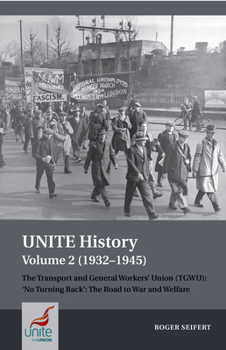Unite History Volume 2 (1932-1945): The Transport and General Workers' Union (Tgwu): 'no Turning Back', the Road to War and Welfare
(Book #2 in the UNITE History Series)
Sold as a multi-volume set - the individual volumes are also available for purchase.
This is the second volume on the history of the Transport and General Workers' Union (TGWU), covering the period 1932 to 1945. In 1931, when the economic slump created mass unemployment, the TGWU was a large rambling union. The union lost members, struggled to hold its activists together, and split politically between communists and their allies and the right-wing labour leadership of Bevin. This spilled over to the struggle of the unemployed, the role of the state, and attitudes to the growth of fascism at home and abroad. By the late 1930s, an armament-inspired boom allowed the TGWU to negotiate industry-wide formal agreements in many of its strongholds - docks, passenger and commercial road transport, and general labourers. These deals favoured the weak but held back the strong such as the London bus workers who staged strikes based on rank-and-file organisation. These were matched by local strikes against a range of speed-up initiatives. The TGWU backed rearmament and the war when it came. The leadership put aside its anti-communism for the duration, and communist-inspired shop stewards played major roles in improving war-time productivity. The union grew and large numbers of women joined, forming their own groups and playing an increasing role in union affairs. At the same time the TGWU hesitantly supported liberation in the colonies. As the war came to an end, the union supported the welfare reforms of the Beveridge report and backed the election of a Labour Government.





